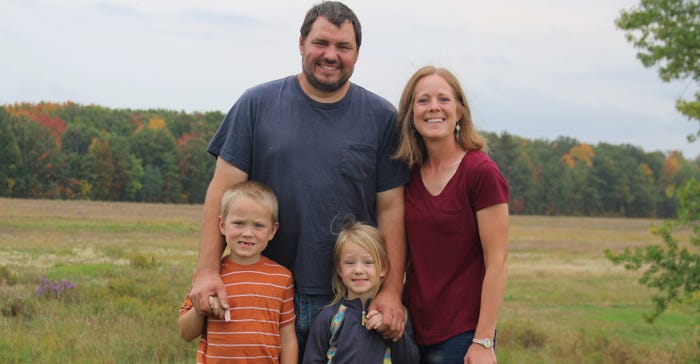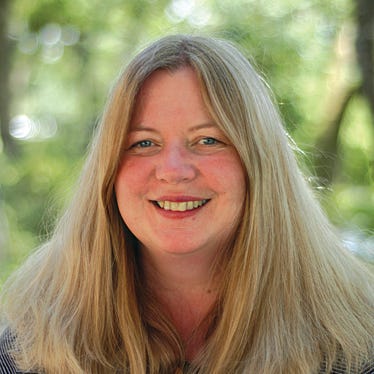
Stevens Point crop farmers John and Melissa Eron have been selected as the recipients of the 2020 Wisconsin Leopold Conservation Award. Given in honor of renowned conservationist Aldo Leopold, the award recognizes farmers and foresters who inspire others with their dedication to land, water and wildlife habitat management on private working land.
In Wisconsin, the $10,000 award is presented annually by Sand County Foundation, American Farmland Trust, Wisconsin Farm Bureau Federation and Dairy Farmers of Wisconsin.
The Erons were announced as this year’s award recipient at the Nov. 19 meeting of the Wisconsin Board of Agriculture, Trade and Consumer Protection in Madison. They received a check for $10,000 and a crystal award for being selected. A video celebrating their conservation success will be premiered during the Wisconsin Farm Bureau Federation’s virtual annual meeting on Dec. 4.
“We were very surprised about winning the award and quite excited,” says Melissa, 35. “We were nominated by our neighbors, and we were really surprised to win — and we’re very honored. It’s been a real whirlwind experience. We are very grateful that we won.”
Lifelong farmers
The couple farm about 750 owned and rented acres in Portage and Wood counties. They are the second generation to farm on the family farm. John’s parents, Chester and Caroline, started farming there in the 1970s. John, 41, and Melissa bought their first farm in 2011.
John has been farming his whole life. Melissa grew up on a dairy farm in Minnesota. She graduated from the University of Wisconsin-River Falls with a bachelor’s degree in marketing communications. The couple have two children: Jack, 6; and Nora, 4.
The Erons’ conservation story is one of innovation and ingenuity. Their farm’s heavy clay soils were often wet during the spring planting season, dry by summer and wet again by fall. John devised a commonsense, though untested, plan: He’d capture and store runoff water and use it later to irrigate crops.
After researching his idea, he got to work. John bought and renovated used excavation and irrigation equipment, a skill he learned from his father. He dug a series of strategically placed ponds in partnership with the Portage County Land Conservation Department, Wisconsin Department of Natural Resources and U.S. Army Corps of Engineers. Drain tiles were directed to the ponds. Any flooding from the ponds is directed via pipes to a wood-chip bioreactor to remove nutrients.
John excavates sediment deposits in the ponds and recycles those nutrients back onto his fields, which reduces his need for fertilizer while boosting yields and profitability. The positive results have prompted the Erons to install similar water and nutrient recycling systems on other farms they’ve acquired.
This “closed system” the Erons created protects Mill Creek. This Wisconsin River tributary that runs through their farm has long been on a list of phosphorus-impaired waters. As president of the Farmers of Mill Creek Watershed Council, John leads farmer-led efforts to promote farming practices that ensure clean water and healthy soils. The council has accessed grants to fund on-farm research and installation of buffer strips next to the creek.
Teaching opportunities
The Erons have hosted many fields days and lunch-and-learn events to motivate other landowners to adopt conservation practices. They have also held several day-on-the-farm events to teach area school kids about bugs, soil, cover crops, native plants, conservation, pollinators and irrigation. They understand that the future of agriculture must consider the environment, and future agriculturists must be educated about it today.
The Erons manage soil moisture and health through the use of cover crops and no-till planting. They are growing fewer row crops by experimenting with raising alternative forages for area dairy farmers. This is another way to keep their fields in a continuous cover to prevent soil loss. Field corners and other hard-to-farm areas are planted with native wildflowers and grasses to create pollinator and wildlife habitat.
“There is constant need for innovation to adapt to ever-changing environmental conditions,” John says.
John serves as the appointed weed commissioner for Portage and Wood counties, where he works with local and regional stakeholders to combat wild parsnip and other land-based invasive species. He also serves on the local school board and chairs the planning commission in his township. The Erons diversified their business by converting a former dairy barn into an event venue for weddings and other gatherings.
Their land ethic is expressed through their dedication to responsible land management, agricultural sustainability, education and outreach, innovation, and advocacy for constructive change.
“Wisconsin Farm Bureau is proud to work with the Sand County Foundation to recognize and highlight farmers for their outstanding conservation efforts,” says Wisconsin Farm Bureau President Joe Bragger. “The Erons are extremely deserving of this honorable award. John is known as the go-to conservation person in his area of the state and has great compassion in caring for the land. As farmers, John and Melissa understand the importance of working with a variety of groups so together we can make the land better for future generations.”
“DATCP is proud to partner with the Sand County Foundation to recognize John and Melissa Eron for their commitment to agricultural conservation,” adds Randy Romanski, secretary of the Wisconsin Department of Agriculture, Trade and Consumer Protection. “Soil and water health are critical to the success of our agriculture industry and our state’s economy. We applaud the hard work and creativity of the Eron family, and appreciate their dedication to this important conservation work.”
“Recipients of this award are real-life examples of conservation-minded agriculture,” says Kevin McAleese, Sand County Foundation president and CEO. “These hardworking families are essential to our environment, food system and rural economy.”
Award finalists
Earlier this year, owners of Wisconsin farmland and forests were encouraged to apply or be nominated for the Leopold Conservation Award. Applications were reviewed by an independent panel of agricultural and conservation leaders. Among the many Wisconsin landowners nominated for the award were these finalists: Mike Berg of Lafayette County, Charlie Hammer and Nancy Kavazanjian of Dodge County, Brian Maliszewski of Trempealeau County, and John and Dorothy Priske of Columbia County.
The first Wisconsin Leopold Conservation Award was presented to woodland conservationist Gerry Mich of Appleton in 2006. The 2019 recipient was farmer Jeff Lake of Boyceville.
The Leopold Conservation Award in Wisconsin is made possible thanks to contributions from Dairy Farmers of Wisconsin, Wisconsin Farm Bureau Federation, Compeer Financial, Culver’s, McDonald’s, USDA Natural Resources Conservation Service, We Energies Foundation, Wisconsin Corn Growers Association, Wisconsin Corn Promotion Board, Wisconsin Land and Water Conservation Association, and Wisconsin Potato and Vegetable Growers Association.
In his influential 1949 book, “A Sand County Almanac,” Aldo Leopold called for an ethical relationship between people and the land they own and manage, which he called “an evolutionary possibility and an ecological necessity.”
Sand County Foundation presents the Leopold Conservation Award to private landowners in 21 states with a variety of conservation, agricultural and forestry organizations. Sand County Foundation presents the award in California, Colorado, Kansas, Kentucky, Missouri, Montana, Nebraska, New York, North Dakota, Oklahoma, Pennsylvania, South Dakota, Texas, Utah, Wisconsin, and in New England (Connecticut, Maine, Massachusetts, New Hampshire, Rhode Island and Vermont).
For more information on the award, visit leopoldconservationaward.org. To see photos of the Eron farm, click through the slideshow.
About the Author(s)
You May Also Like






